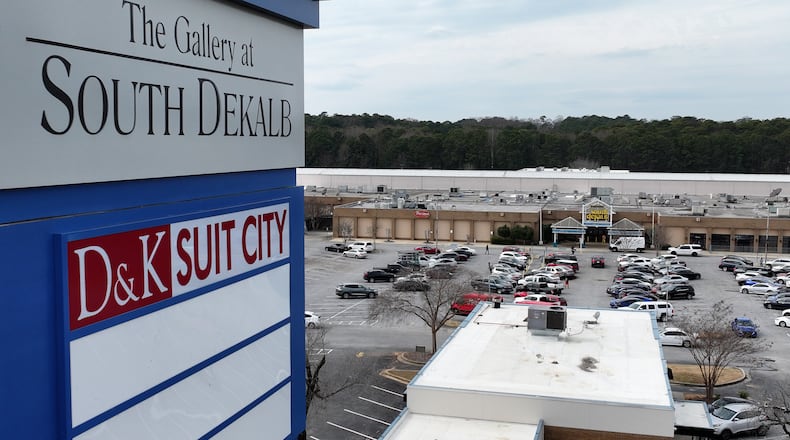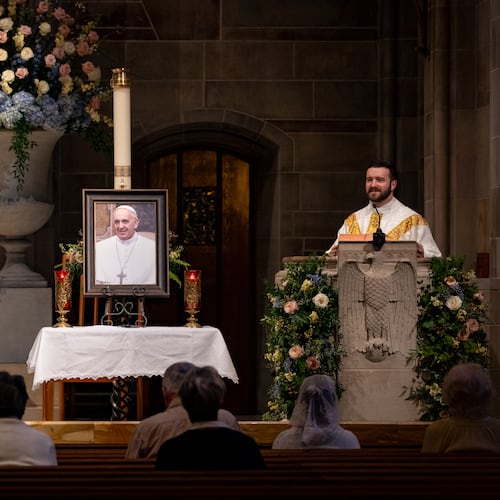Modern DeKalb County was born when Scott Candler created the first county-owned water and sewer system south of Virginia, and lured a General Motors plant to Doraville after World War II.
North DeKalb has boomed unabated since.
But those pipes created a socioeconomic division between the county’s northern and southern halves that has persisted for more than 80 years. GM picked Doraville over the Constitution area of southern DeKalb, partly because the newly-installed water mains were bigger up north, according to a written history of the city.
DeKalb ended up neglecting Candler’s famous pipes, eventually violating the Clean Water Act with frequent sewer spills. The vast majority of overflows occur in the Snapfinger basin in southwestern DeKalb, where infrastructure limitations have combined with a history of racism to stymie development.
Credit: Hyosub Shin
Credit: Hyosub Shin
So when the DeKalb County Board of Commissioners voted late last month to increase water and sewer rates by 159% over the next decade, they described the decision as a bitter pill that could nevertheless heal the divide by funding billions of dollars in necessary infrastructure fixes.
“We are now balancing out that equation,” said Commissioner Robert Patrick, a former Doraville councilman who chairs the DeKalb’s infrastructure committee. “The significance of this rate increase is development on the south side.”
Many DeKalb residents complained about the rate hikes, but some said they were overdue.
Gentrification is taking hold in the Snapfinger basin, fueled by the nationwide housing affordability crisis and the area’s proximity to Atlanta, Decatur, interstate highways and the world’s busiest airport, Hartsfield-Jackson Atlanta International Airport. But the southern half of DeKalb is still awash in fast food chains, auto shops and run-down convenience stores, even near subdivisions that have become bywords for Black wealth.
Some residents say the area needs housing. More call for higher-quality stores and restaurants.
But a lack of sewer capacity halted most new development in south DeKalb until three years ago, former CEO Michael Thurmond said.
Peaches Cooper, 62, has lived in DeKalb, just south of Atlanta’s East Lake neighborhood, for more than 40 years — through white flight and gentrification. New condos and apartments are going up nearby, but retail options are lacking, she said. She pointed to The Gallery at South DeKalb, a Panthersville mall that is now dilapidated and largely vacant.
Credit: HYOSUB SHIN / AJC
Credit: HYOSUB SHIN / AJC
Cooper said some good new restaurants recently opened in the area, but questioned the timing.
“That’s the sad thing, because DeKalb is considered one of the wealthiest areas for Blacks,” she said. “Certain things shouldn’t take whites moving in, or back in I should say.”
Allen Cabrera, 40, moved to the area in 2009 from Miami. Now he has two small children, lives off Bouldercrest Road and wishes there was more in south DeKalb for families to do together. Friends recommend outings in places like north Gwinnett County, almost 40 miles away. The closest restaurant for a special-occasion dinner is a Red Lobster on Candler Road.
“That’s not, like, the best area to be in,” Cabrera said.
South DeKalb could be fertile ground for young adults who want walkable neighborhoods with entertainment offerings similar to some developments in the county’s northern half, said Larry Johnson, who represented the southwestern district on the County Commission for more than 20 years before losing last year’s county CEO race.
“It’s our turn now,” Johnson said. “But it’s a 50-year fix. It’s not an overnight proposition.”
Poised for growth
Before the GM plant opened in 1947, DeKalb County was comprised of rock quarries and dairy farms, said Thurmond, who moonlights as a historian.
The postwar suburban boom brought white families to the county, south as well as north. But in the 1970s, when Black people began moving to south DeKalb after the Fair Housing Act took effect, white residents fled rather than integrate. De facto segregation took hold, with Memorial Drive dividing the white north and Black south.
A 1988 Atlanta Journal-Constitution investigation found mainstream lenders avoided middle-class Black neighborhoods in south DeKalb but offered mortgages in white neighborhoods with lower incomes in north DeKalb.
The series, called “The Color of Money,” won the Pulitzer Prize for investigative reporting and led to lending reforms. But the effects of predatory lending devastated south DeKalb again 20 years later, after the subprime mortgage industry disproportionately targeted wealthy Black households.
The ensuing foreclosure crisis hammered the southern half of the county harder than the north. Property values in south DeKalb remained depressed years after they recovered for similar homes in the north, exacerbating the socioeconomic divide. As population growth stalled, commercial properties in south DeKalb suffered, too.
And in 2010, the state and federal governments sued DeKalb over the amount of sewage the county’s system spilled into waterways. The resulting settlement, known as a consent decree, limited development in south DeKalb, where spills were most frequent, as the housing market began to recover, officials said.
A few months into the consent decree, a watershed employee pleaded guilty to taking bribes from owners of restaurants he inspected, spawning a criminal investigation into watershed contracts that ended with the indictment of then-CEO Burrell Ellis. The leadership of the county, and its watershed department, remained unstable for years.
Amid the chaos, tens of thousands of households erroneously received outrageously high water bills, prompting a five-year shut-off moratorium.
Thurmond ran for CEO in 2016, saying he would restore trust in the government. He had served as state labor commissioner and received acclaim for stabilizing the DeKalb school system during his time as superintendent. He won in a landslide. His inauguration speech focused on the rift between north and south DeKalb.
To revitalize the south, the county would have to spend billions of dollars to upgrade sewer capacity. The consent decree alone mandated hundreds of millions’ worth of fixes by June 2020. But while the water billing crisis persisted, DeKalb could not raise rates to bring in the necessary revenue, Thurmond said. The county didn’t even come close to meeting the 2020 deadline.
The next year, the county renegotiated the consent degree, securing a seven-year extension and a “capacity assurance program” that allowed more buildings to connect to the sewer system once certain projects were completed. DeKalb also replaced tens of thousands of water meters and raised rates in 2022.
But new economic trouble had begun in south DeKalb. Private equity firms in 2021 bought more than half the homes south of Memorial Drive. The AJC’s “American Dream for Rent” series found that the investors rented the homes out, raising the bar for homeownership and exacerbating the affordable housing crunch that had by then taken hold.
Gresham Park and Belvedere Park are now poster children for gentrification. Close to the desirable enclaves of East Atlanta and Decatur, respectively, both neighborhoods saw an influx of white residents and substantially higher household incomes since Thurmond took office in 2017, according to an AJC analysis of census data.
More housing would help balance supply and demand, officials said. That requires repairs to the sewer system — and the water system, which is in similarly bad shape although not the subject of long-running litigation.
Credit: HYOSUB SHIN / AJC
Credit: HYOSUB SHIN / AJC
During Thurmond’s eight years in office, which ended Dec. 31 because of term limits, infrastructure was one of his main priorities. Restoring integrity to the office, addressing the socioeconomic divide and laying pipes were really one interconnected effort, he said.
“One of the most difficult things is to prove a negative of something that didn’t happen,” Thurmond said. “How valuable is it that the sewage stayed in the pipes on this particular day? It’s hard to quantify that, right? But trust me, it is valuable and I think that the Snapfinger basin, south DeKalb, is poised, frankly, for exponential growth in the years to come.”
The bill increases
By the end of 2024, about 4,000 housing units south of Memorial Drive were approved under the terms of the new consent decree, according to data provided by the county. Sewer capacity improvements also allowed DeKalb to permit almost 50 stores and more than 40 restaurants in the area.
Credit: HYOSUB SHIN / AJC
Credit: HYOSUB SHIN / AJC
Infrastructure upgrades are enabling mixed-use developments at the Indian Creek MARTA station and the former Hidden Hills Golf Course, officials said. The developers of some projects, including Hidden Hills, are paying some of the sewer rehab costs, according to county records.
“We see all the beautiful shiny skyscrapers and developments and politicians cut ribbons,” Thurmond told the AJC’s “Politically Georgia” podcast. “What we don’t embrace or understand is, unless you have infrastructure below ground, none of this occurs above ground.”
Credit: Miguel Martinez-Jimenez
Credit: Miguel Martinez-Jimenez
On Thurmond’s penultimate day in office, he cut a ribbon on the south side, celebrating a $270 million expansion of the Snapfinger Creek Wastewater Treatment Plant. The project was delayed for 11 years while corruption scandals engulfed elected officials and two consecutive contractors. The ribbon-cutting ceremony was billed as Thurmond’s last official act, a symbol of his legacy.
The next day, Thurmond’s last as CEO, he informed state and federal regulators in writing that DeKalb would not complete all the mandated repairs by the 2027 consent decree deadline he negotiated. Cost increases because of inflation, and arguments over where to store excess wastewater during storms in south DeKalb, contributed to the delay.
Credit: Jenni Girtman
Credit: Jenni Girtman
Environmental officials and U.S. District Judge Steven Grimberg expressed exasperation with the county in court. Grimberg questioned whether the county was taking the agreement seriously. The state Environmental Protection Division calculated DeKalb could be fined as much as $100 million.
During Thurmond’s second term, Lorraine Cochran-Johnson and Ted Terry each represented “super districts” on the county commission, with Cochran-Johnson in the eastern half and Terry in the west. Both also served on the infrastructure committee. Both said Thurmond should have proposed more rate increases during his tenure.
Cochran-Johnson, who took over this year as CEO, nevertheless said Thurmond’s work on infrastructure has resulted in progress toward closing the socioeconomic gap between north and south DeKalb. She has appointed a chief development officer — a position new to DeKalb —to facilitate more economic development.
Although Terry and Thurmond sometimes disagreed, Terry credits the former CEO for apartments and shopping centers going up in south DeKalb.
“A lot of that work is going to happen in the next eight years because of what happened in the previous eight years,” Terry said. “DeKalb got back to basics.”
Thurmond is expected to run for governor next year. It was Cochran-Johnson who proposed to increase water and sewer rates 10% annually for 10 years, raising the average residential monthly bill from $70 to nearly $182 by 2034.
Residents objected at meetings. Two of the seven commissioners dissented. All approved sliding-scale rates and other protections for low-income households.
Before voting in favor of the rate increases, Terry said they will fund new housing and businesses that his constituents have been asking for.
“Paving the way for more economic opportunity for these areas that have been underinvested in is, to me, one of the hallmarks of this legislation,” he said.
— Staff writer Greg Bluestein and data reporter Stephanie Lamm contributed to this article.
About the Author
Keep Reading
The Latest
Featured







